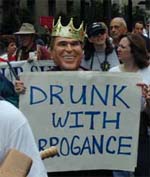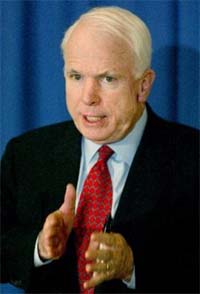
|
|
|
|
George W. Bush's Iraq Fallu-cination |
|
"I call it the Madman Theory, Bob. I want the North Vietnamese to believe I've reached the point where I might do anything to stop the war. We'll just slip the word to them that 'for God's sake, you know Nixon is obsessed about Communists. We can't restrain him when he's angry -- and he has his hand on the nuclear button' -- and Ho Chi Minh himself will be in Paris in two days begging for peace."
Last week, the bad news on Iraq came on like a hurricane: The New York Times revealed that a late-July report produced by the National Intelligence Council (NIC) forecast "a dark assortment of prospects for Iraq." The highly-classified National Intelligence Estimate -- the first report on Iraq put together by the NIC since October 2002 and approved by the National Foreign Intelligence Board under acting CIA Director John McLaughlin -- concluded that there were three possible outcomes for Iraq in 2005: At best the country would be in a constant state of tenuous stability; at worst, there could be civil war. Former military officials, retired General William Odom, former head of the National Security Agency, and retired General Joseph Hoare, a former Marine commandant and head of U.S. Central Command, chimed in with their criticisms of the president. General Odom maintained that given "the course we're on, we're achieving Bin Laden's ends." General Hoare, pointing out that the administration appeared incapable of adjusting to the reality on the ground, said: "There are no good options. We're conducting a campaign as though it were being conducted in Iowa, no sense of the realities on the ground."
Back to the UN On Tuesday, September 21, President Bush -- who two years ago warned that "unless the United Nations shows some backbone and courage, it could render the Security Council irrelevant" -- made his way back to New York City and again addressed the UN General Assembly, trying to rally the world to join the quagmire. AFP reported that President Bush "demanded more UN action to help end the deadly chaos that has followed the U.S.-led invasion." For the umpty-umpth time the president defended his decision to go into Iraq. With memories of Colin Powell's now discredited and utterly fictitious February 2003 speech "justifying" a possible invasion of Iraq -- complete with twisted facts and ridiculous exhibits of Iraq's chemical and biological weapons -- fresh in their minds, representatives received the president politely but coolly. Two years after telling the UN that Saddam Hussein posed ''grave and gathering danger'' President Bush "told a subdued UN General Assembly session that the U.S.-led overthrow of Saddam Hussein delivered the Iraqi people from ''an outlawed dictator,'" the Associated Press reported. "The UN and its member nations must respond to Prime Minister Allawi's request and do more to help build an Iraq that is secure, democratic, federal and free," said Bush, whose speech drew applause only when it ended, AFP reported. Noticeable by its absence were any comments about the absence of Iraq's stockpiles of weapons of mass destruction or the lack of evidence tying Hussein's to al Qaeda, the two major justifications the Bush Administration advanced for invading Iraq. While Bush's UN appearance will not win significant support from member states, it might yield a few political points at home: "It's a great visual for domestic purposes," Kenneth Adelman, a Reagan administration arms-control official who is close to many top Bush aides, told the Washington Post. "It undercuts Kerry's argument against Bush that he doesn't get along with other countries. They won't be booing him. They'll be politely applauding because they're well-mannered folks." The 'Madman Theory' Although McCain was critical of Bush, he clearly wasn't advocating disengagement, calling instead for a ramped-up military presence. And now that the president's less-than-robust appearance before the UN is over, he appears to be ready to go it alone again. News reports have the Pentagon readying its forces for an all-out assault on Fallujah and perhaps other cities. According to Reuters, "The Pentagon has begun tapping its $25 billion emergency fund for the Iraq war to prepare for a major troop rotation and intense fighting this fall, administration officials said on Tuesday, [September 21] despite the White House's initial insistence that it had enough money." However, if journalist Bob Novak is correct, Team Bush is preparing to leave Iraq if the president wins in November. According to Novak, "Well-placed sources in the administration are confident Bush's decision will be to get out. They believe that is the recommendation of his national security team and would be the recommendation of second-term officials. An informed guess might have Condoleezza Rice as secretary of state, Paul Wolfowitz as defense secretary and Stephen Hadley as national security adviser. According to my sources, all would opt for a withdrawal." But November's results may not come soon enough for Bush. There's still the matter of Fallujah to deal with. Having strutted and pranced about the world stage for the past three years, President Bush has reached another corner that needs turning. In his desire to extricate himself from the chaos of Iraq he may be reaching back into history and grasping for Richard Nixon's playbook which included what Nixon referred to as his "Madman Theory." If Bush takes the "Madman Theory" to heart, around every corner in Fallujah will lay more bodies in the rubble. Regardless of how he proceeds, the president cannot turn back the clock to those heady days in late-March and early April 2003 when triumphalism was in the air and the administration's neoconservatives comfortably appeared in public. U.S. casualty figures were low; the damage was minimal; looters, not suicide bombers, were making their way around Baghdad with impunity; embedded reporters were regaling Americans were stories of heroism and conquest; U.S. businesses were poised to move in and reap the rewards of victory; and the President of the United States was strutting about the world stage thumbing his nose at the rest of the world. Bush's oft-trumpeted qualities of being decisive, steadfast and unwavering may have played well in those days, but are now his Achilles heel: Evidence continues to mount that he's trapped by spinmeisters in a time capsule spinning out of control, unwilling to listen to, process, or accept the steady stream of bad news coming from Iraq. |
|
 George W. Bush continues to show his arrogance on the campaign trail
George W. Bush continues to show his arrogance on the campaign trail  Sen. John McCain declared his unease with developments in Iraq
Sen. John McCain declared his unease with developments in Iraq